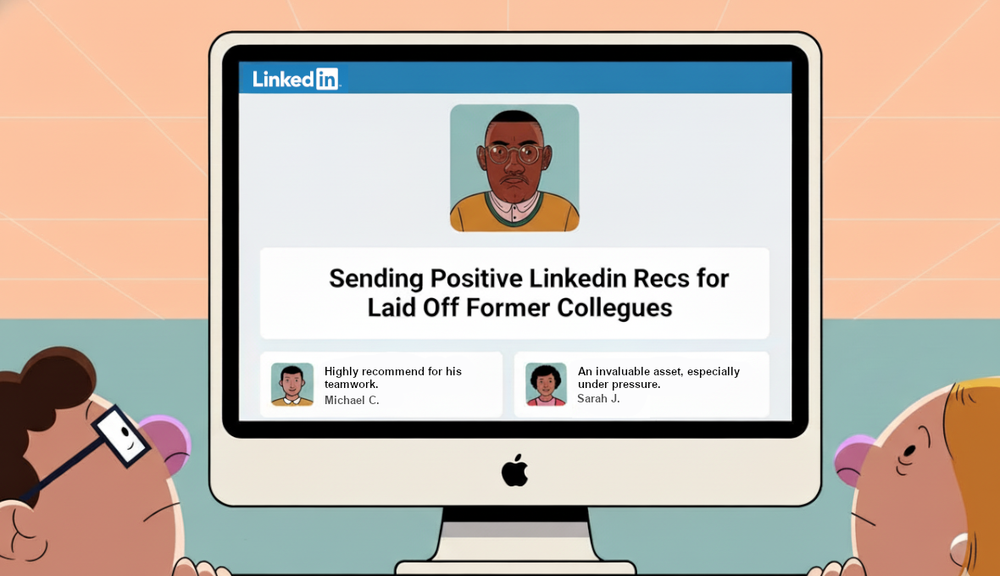Seeing peers lose their jobs has a way of making people weird. It’s not much different from grief. When someone loses a loved one, you can almost feel the tension: people fumbling for the right words, hoping not to say something insensitive, then saying something insensitive anyway. “Everything happens for a reason.” “They’re in a better place.” That is, assuming any condolences are shared at all.
Many of us have been there. You don’t want to overstep. Don’t want to make the person feel worse. I get it: Showing sympathy can feel like a minefield. The same thing happens when companies downsize their staff, only the loss isn’t life. It’s employment.
When someone gets laid off, it’s a kind of corporate death. One day, you’re working alongside someone, swapping memes on Slack, surviving the same back-to-back meetings. The next day, their desk is vacant, their Slack photo appears black-and-white, and their email account forwards incoming messages to whoever has inherited their responsibilities.
I’ve been on both sides of this situation, a casualty and a survivor. I’ve seen folks who are lucky enough to evade the chopping block minimize, deflect, or disappear. It’s not that people are cruel. They’re uncomfortable. Layoffs remind us how little control we have over our own jobs. And in that discomfort, we forget the person in front of us is going through some real s**t.
I remember working at a startup in a contractor role that was cut abruptly after nearly a year. One acquaintance, a guy named Tyler, stopped by my desk to check in before my last day. He somehow made my departure about him: “We’re already such a small team, I don’t know how they expect us to get all of this work done.” I rolled my eyes.
Another well-meaning coworker at least showed concern. But after offering some empty platitudes (“When one door closes, another opens”), she asked an unanswerable question: “What are you gonna do?” I wanted to say, “I don’t know, Janice, probably stress-eat a pack of Oreos, go on a weekend bender, and then obsessively scroll LinkedIn for my next job,” but I just kept it to the first four words.
What stung the most was the colleagues who suddenly acted like I was contagious. You’d think I was on Power the way these people suddenly went Ghost. You can feel that void, that interrupted rhythm of virtual or real-life interaction. I assume they probably don’t know what to say, so they say nothing. It’s still wack.
Here’s the thing: It’s not all that difficult to show up for someone who is suddenly out of work. You don’t have to fix their situation; you just have to let them know you see them. Ask how they’re doing. Validate their feelings. Tell them something you’ll miss about them.
You don’t need a motivational speech. A simple, “That’s awful, I’m really sorry you’re dealing with that,” can mean a lot. Instead of clichés like, “You’ve got this!” offer your presence. “If you want to talk, I’m here” works just fine.
Get specific about how you’d like to be supportive. “Let me know if you need anything” rarely goes beyond lip service. Instead, offer to share job postings you come across or connect your newly unemployed colleague with contacts at companies that may be hiring. If appropriate, you can even offer to serve as a reference.
Those suggestions are baseline, but my former boss at the aforementioned job did something small that went a long way. In my final leadership meeting, she carved out time so other managers could express kind words and farewells. One by one, they spoke about my poise under pressure, my witty emails, that one project that I managed to perfection. I felt appreciated. It reminded me of the impact I made over a short period of time. It reminded me that I would be an asset in my next gig.
When I’ve seen layoffs up close, I’ve noticed something: The people who show up make all the difference. It’s not about having the perfect words. It’s about presence. Jobs come and go. Titles change. But the way we treat each other when things fall apart? That’s what people remember the most.
